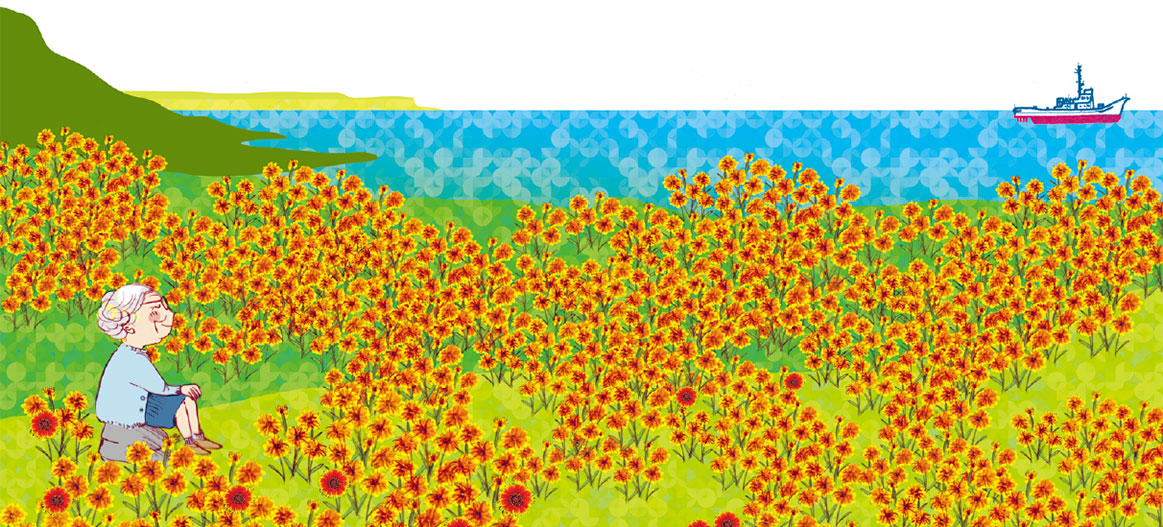
Grandma Penghu - Marjorie Ingeleiv Bly【Parent-Child Reading Guide】
點閱次數:261
God’s Angel in Penghu
Marjorie Ingeleiv Bly
In the past, Penghu had the highest population of lepers in Taiwan. Looking back, it is difficult to imagine that at one point, an entire airplane was even chartered to transport serious leprosy patients to Peng-hu for isolation. People had thought that leprosy was incurable and was a punishment sent by gods. They would not allow family members with leprosy to leave their houses and would hide those members away to avoid expulsion by neighbors. There were not clinics for treating leprosy, either.
Marjorie Ingeleiv Bly was an American nurse born in 1919. In 1952, she arrived in Taiwan for medical missions, and at Lo-sheng Sanatorium in Taoyuan she came into contact with leprosy patients from Penghu. She knew that leprosy was not as contagious as people had assumed, and that with the treatment available overseas, the patients could even go on to have normal lives with regular checkups and medication. Therefore, she volunteered to go to Penghu to treat lepers there.
Marjorie went to Penghu in 1954, the locals were extremely curious about her. Enthusiastic, young, and beautiful Marjorie quickly became known throughout the parts and was affectionately called Miss Bly.
However, her foreign identity became an obstacle when she tried to visit patients. In order to get to know the patients, she went from door to door, but everyone was fearful of her knock. Later on, she took on a gentleman from Taipei named Pan Jin-zhang as her assistant, whose job was to knock on a patient’s door and make sure the patient was willing to accept treatment before Miss Bly secretly entered to visit.
In order for Miss Bly and Mr. Pan to visit patients on Penghu’s scattered islets, her mother church in the US raised funds to buy a sampan. She went around in the sampan delivering medication and making sure her patients were taking theirs regularly. She often bought food out of her own pocket to give to the poor, and would even buy chicks, ducklings, and piglets for the patients so they could support themselves.
Later, she started the Special Dermatology Clinic at the then Taiwan Provincial Penghu Hospital in Makung, Penghu’s largest town, to treat leprosy free of charge. She invited doctors from abroad and Taiwan Main Island to see and operate on the patients. Miss Bly and two other nurses would clean the wounds and apply medication. Patients in need could also get free flour, milk powder, and second-hand clothes.
The Special Dermatology Clinic had an independent waiting room and entrance for the privacy of the patients. On the clinic’s wall there was a picture of Jesus caring for children. When the patients brought their children with them, she would take pictures of the children with the image of Jesus. She would even assist with the children’s tuition. On the walls were two bamboo plaques engraved with “Don’t be afraid, just believe,” and “A joyful heart is good medicine.”
Miss Bly would often study the methods for treating leprosy late into the night alone at her rented second-floor apartment in downtown Makung. Someone once said to her: “I would not do your work if somebody paid me a million.” She replied, “If it were for a million, I would not do it either.” Miss Bly willingly devoted her life to lepers because of God’s love.
She never received a salary and all her expenses relied on the support of her church in America and her family and friends. Miss Bly led a very simple life. She would mend her clothes when they wore out and she never got new furniture. She spent all her money on nutrients and medication for her patients.
Gradually, most of the locals got to know and like her, and were willing to accept lepers. Everyone said, “If Miss Bly is not afraid, why should we be? ” Through her attentive care, follow-up, and treatment, all the leprosy patients in Penghu started to recover and eventually lead normal lives.
To preserve the privacy of her patients, Miss Bly turned down interviews by the media. She regarded the identities of her patients as highly confidential, an attitude that earned her the trust and respect of them. Miss Bly became like a family member for her patients, and they would tell her when their sons were about to get married or when their grandchildren were taking college-entrance exams.
After forty years of hard work, leprosy was eradicated from Penghu and Miss Bly’s work was finally done. In 2003, the Speical Dermatology Clinic was closed and all the medial records were destroyed.
After retiring, her family asked her to return to the U.S. but she already felt like a native of Penghu. She even wrote in her will, “Penghu is my home and I want to be buried in Taiwan after I die.” She later became ill, left her home in Makung, and was transferred to Penghu Hospital. Up to her death on April 8, 2008, she was often surrounded by people who all said, “It is a blessing to be able to take care of Auntie Bly.”
From Miss Bly, Auntie Bly, to Grandma Penghu, Marjorie Ingeleiv Bly devoted all her life, passion, and love to the leprosy patients in Penghu.